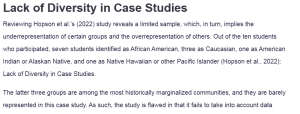Lack of Diversity in Case Studies
Reviewing Hopson et al.’s (2022) study reveals a limited sample, which, in turn, implies the underrepresentation of certain groups and the overrepresentation of others. Out of the ten students who participated, seven students identified as African American, three as Caucasian, one as American Indian or Alaskan Native, and one as Native Hawaiian or other Pacific Islander (Hopson et al., 2022): Lack of Diversity in Case Studies.
The latter three groups are among the most historically marginalized communities, and they are barely represented in this case study. As such, the study is flawed in that it fails to take into account data from a fully diverse sample, and, therefore, its results or recommendations will be limited, as it will not address issues affecting children from these specific communities.
One way that researchers can improve this study and make it more trustworthy is by expanding their research setting to as many facilities as possible to ensure a balanced representation of all the communities. This will make certain that the research has collected all the data from different communities, which will help in making tailor-made solutions for each community because they all deal with unique problems. In addition, by doing this, communities that were initially underrepresented in the study will not be overlooked as they would have been when their sample number was significantly less compared to others.
Such an inclusive strategy is fundamental to research because it ensures that the data provided will address the problems of the entire community; this way, there are equitable recommendations for everyone. Otherwise, the study will most likely end up only highlighting the needs of the majority and overlooking others, which only reinforces the existing disparities, creating an unfair society.
References
Hopson, L. M., Kenney, J. L., Church II, W. T., & Beck, J. (2022). “Never give up.” Adjudicated girls’ school experiences and implications for academic success. International Journal of School Social Work, 7(1), 5.
ORDER A PLAGIARISM-FREE PAPER HERE
We’ll write everything from scratch
Question
Review the methods section of the qualitative article found in Module 10 Readings section entitled “Never give up.” Adjudicated girls’ school experiences and implications for academic success.

Lack of Diversity in Case Studies
In a post address the following:
- Explain one implication of the study for diverse, oppressed, and underserved populations.
- Describe one way in which the researchers could improve the study and make it more trustworthy.

